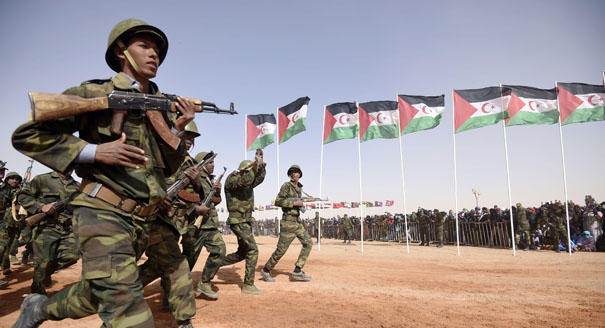Mustaqbal Misr has expanded its portfolio with remarkable speed, but a lack of transparency remains.
Yezid Sayigh
{
"authors": [
"Intissar Fakir"
],
"type": "commentary",
"blog": "Diwan",
"centerAffiliationAll": "",
"centers": [
"Carnegie Endowment for International Peace",
"Malcolm H. Kerr Carnegie Middle East Center"
],
"collections": [],
"englishNewsletterAll": "",
"nonEnglishNewsletterAll": "",
"primaryCenter": "Carnegie Endowment for International Peace",
"programAffiliation": "",
"programs": [
"Middle East"
],
"projects": [],
"regions": [
"North Africa",
"Algeria",
"Morocco",
"Maghreb"
],
"topics": [
"Political Reform"
]
}
Morocco is approaching the Western Sahara issue with greater tactical flexibility, and it appears to be reaping benefits.
The international community and the parties involved in the Western Sahara issue have over the years become comfortable with the absence of a resolution. The entrenched positions of Morocco on the one side and Algeria and the Polisario Front on the other, as well as each side’s fears of a disadvantageous resolution, have compelled all the actors to accept the status quo.
The international community has been nervous about pushing either party too hard for fear of destabilizing the region. Faced with this impasse, Morocco’s approach has been, essentially, to continue making its best offer before the United Nations and with its Western partners: offering greater autonomy for the Western Sahara within the Moroccan state while at the same time pursuing its own internal agenda for development of the region.
Rabat has also aimed to tackle the issue within an African context. While the Polisario Front and Algeria have historically controlled the narrative in Africa, where they have had more support on the Western Sahara issue, Morocco’s recent engagement with Africa, which included joining the African Union in January 2017, is aimed at changing this reality. Morocco’s newfound affinity for Africa has numerous political, economic, and security drivers, but Rabat appears also to be trying to marginalize the Western Sahara issue by implicitly offering would-be African partners the promise of greatly improved economic and security ties that would offset the support and sympathy the Polisario has received over the years.
The Western Sahara issue, which was once again in Moroccan headlines recently on the November 6 anniversary of the Green March, which took place 42 years ago, has been intractable, with competing narratives and vastly different ideas of what an equitable solution looks like. For Morocco, the issue has been a question of regaining and securing territorial integrity. For the Polisario Front it is one of incomplete decolonization. And for Algeria it is about supporting an independence movement while also meddling in the kingdom’s politics and limiting what it views as Morocco’s regional influence.
During the 1990s and into this century, serious efforts to resolve the issue through the UN all failed. Algeria and the Polisario Front rejected one proposal—known as Baker I, named after former U.S. secretary of state James Baker, who acted as the UN secretary general’s personal envoy to the Western Sahara—because it envisioned autonomy under continued Moroccan sovereignty. And Morocco refused to accept a second proposal, known as Baker II, because it included an eventual referendum that could lead to independence. Central to the lack of a resolution is that the solution each side favors is a non-starter for the other. Basically, Morocco expected a referendum on autonomy alone while the Polisario Front and Algeria wanted a referendum on autonomy or independence. In other words, Morocco rejects any resolution that could undermine its sovereignty over the territory. The Polisario Front and Algeria, in turn, demand a process that leaves Moroccan sovereignty undetermined.
The options for a resolution have evolved along with the Western Sahara issue itself. The UN has shifted its recommendation from holding a referendum to advocating for a negotiated political solution between Morocco and the Polisario Front. The UN has explicitly acknowledged the idea of advanced autonomy within Morocco, which largely aligns with what Rabat has been offering since 2007, when King Mohammed VI presented a plan for the decentralization of all Moroccan provinces, including the Western Sahara. However, the Polisario Front rejected this in the last round of negotiations, which ended in 2008. The impasse remains, even as former German president Horst Koehler, appointed in August as the UN secretary general’s personal envoy for Western Sahara, begins his meetings with parties to the conflict.
With no meaningful process in place yet, Morocco is looking to gain ground on the issue in Africa. Paradoxically, it is doing so by relegating the Western Sahara issue to a secondary position in its relationship with African nations. Historically, Morocco’s relations with many African states were poor due to widespread African support for the Polisario Front. Yet today Morocco seems to favor a more pragmatic approach to Africa. This is in contrast to its historical rigidity on the Western Sahara, where it made endorsement of its claim over the territory a precondition for economic and political ties.
Rabat’s tactic is perhaps similar to how it has approached the Western Sahara with its partners in the West, where it has often sidestepped the issue in its engagement with them. And through important economic and security cooperation, Morocco has demonstrated its importance and gained at least the implicit assurance that key partners will not act against its interests in relation to the Western Sahara.
This assurance has been tested on several occasions. In 2013, for instance, the United States supported adding a human rights mandate to the UN Mission in Western Sahara, before quickly backtracking. It was again tested in 2016, when the European Court of Justice voted against the legality of a European Union-Morocco agricultural agreement that included the Western Sahara, which is prohibited because the territory’s status is contested. However, Morocco and the EU are now negotiating ways to circumvent the ruling. While these and similar examples reflected the success of the Polisario Front’s lobbying efforts, the fact that they amounted to nothing underlined the strength of Morocco’s relations with, and leverage over, its European partners—the result of valuable and long-lasting cooperation.
A similar logic is driving Morocco’s engagement with Africa. When the question of Morocco rejoining the African Union first came up, there was speculation that its membership would be preconditioned on the expulsion from the organization of the Sahrawi Arab Democratic Republic proclaimed by the Polisario Front. Yet, in the end Morocco rejoined despite—and perhaps because of—the presence of the Sahrawi Arab Democratic Republic in the African Union.
While the status of the Western Sahara remains disputed, Rabat is effectively signaling that this should not prevent strong cooperation in other areas. From Morocco’s perspective, this could eventually help its case on Western Sahara. For years Morocco has laid the groundwork for such a shift. Since joining the African Union, the kingdom has concluded multiple agreements with various African nations in banking, real estate, agricultural cooperation, and other fields. It has also improved bilateral relations with countries such as Nigeria and Rwanda, even though they maintain diplomatic relations with the Sahrawi Arab Democratic Republic.
Meanwhile, through these types of cooperation Morocco is gaining a higher profile as an important regional player. This is evidenced in its support for the French G5 initiative in the Sahel, much to the consternation of Algiers. Poor relations between Algeria and Morocco are not limited to the Western Sahara issue. Rather, they are the culmination of a long history of suspicion, fear, misunderstanding, competition, and ideological differences that will not be resolved through a settlement in the Western Sahara.
Morocco’s approach has the advantage of not allowing the Western Sahara to become the most defining feature of its relations with the continent. This is likely to open up important economic opportunities and reinforce Morocco’s value as a regional player among both its African and Western partners, many of whom welcome the greater role it seeks to play in Africa. Its ability to do so will ensure that a resolution of the Western Sahara issue will become much less urgent. Maybe, after years of trying and failing to secure international recognition of its sovereignty over the territory, turning the dispute into a non-issue is precisely what Morocco seeks.
Carnegie does not take institutional positions on public policy issues; the views represented herein are those of the author(s) and do not necessarily reflect the views of Carnegie, its staff, or its trustees.
Mustaqbal Misr has expanded its portfolio with remarkable speed, but a lack of transparency remains.

Yezid Sayigh
The burden of environmental degradation is felt not only through physical labor but also emotional and social loss.

Yasmine Zarhloule, Ella Williams
The country’s youthful protest movement is seeking economic improvement, social justice, and just a little hope.

Yasmine Zarhloule
The Moroccan-Algerian rivalry is playing itself out in ties with Burkina Faso, Niger, and Mali.

Yasmine Zarhloule
In an interview, Yasmine Zarhloule discusses irregular migration to Europe and the shortcomings of a securitization policy.
Rayyan Al-Shawaf